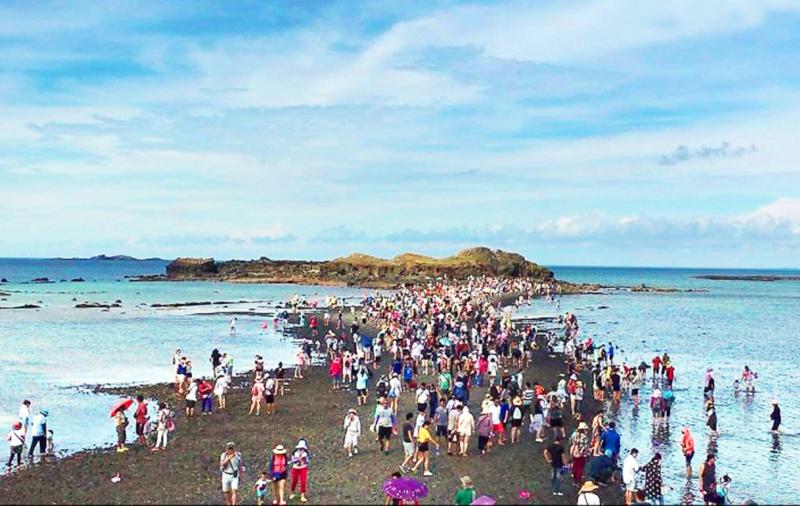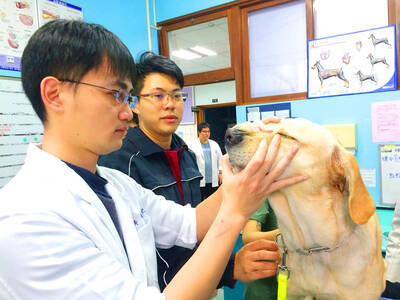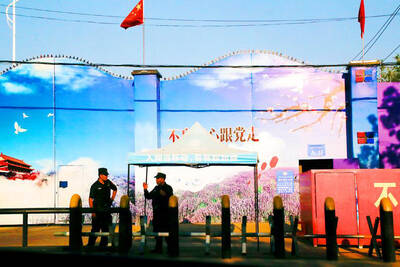The Ministry of Transportation and Communications has secured NT$6 billion (US$203.36 million) to support the tourism industry and bus operators, whose businesses have been disrupted by the COVID-19 situation in Taiwan, Minister of Transportation and Communications Wang Kwo-tsai (王國材) told lawmakers at a meeting of the legislature’s Transportation Committee in Taipei yesterday.
Lawmakers asked Wang when Taiwan’s borders would reopen to tourists, as Singapore, Thailand and South Korea have lifted quarantine requirements for people who are fully vaccinated against COVID-19.
Singapore and Thailand have even allowed people to board flights without a negative polymerase chain reaction test result, they said.

Photo: Chen Hsin-yu, Taipei Times
Japan is planning to reopen its borders to small tour groups from June 10.
Travel agencies, hoteliers and restaurateurs are struggling as they wait for the return of international tourists, Chinese Nationalist Party (KMT) Legislator Hung Meng-kai (洪孟楷) said, adding that the government needs to tell the tourism industry when or under what conditions borders would be reopened.
KMT Legislator Hsu Shu-hua (許淑華) said that the government should continue to provide struggling tour operators with relief, even though the funds the ministry has obtained were earmarked as “stimulus.”
“It is not that travel agencies have not been trying to attract customers, it is that most people do not want to travel amid a surge in confirmed COVID-19 cases nationwide,” Hsu said.
Democratic Progressive Party (DPP) Legislator Liu Shih-fang (劉世芳) said that, in addition to stimulus funds, the ministry should consider giving travel agencies, hoteliers and amusement park operators tax breaks.
The ministry should discuss the possibility with other central government officials and local governments, Liu said.
The Tourism Bureau announced general guidelines governing distribution of the funds.
The final version of the guidelines would be published by the middle of next month, it said.
Of the NT$6 billion, NT$5.5 billion would be to support the tourism industry and NT$500 million would be to fund highway bus operators, Wang said.
The funds would not subsidize businesses and employees for lost revenue and salaries, Wang said.
“We would instead focus on stimulating the growth of the tourism industry, offering subsidies to travel agencies, hotels and amusement parks that attract domestic travelers while the borders remain closed,” he said.
The funds were granted as the government believes the tourism industry “would still need to hang in there for a little while,” given that the number of domestically transmitted cases remains high, he said.
“The Central Epidemic Command Center [CECC] has told us that reopening the borders could cause COVID-19 cases to rise further, adding to the burden on the already battered healthcare system,” Wang said. “Given the limited medical capacity, it wants tourism to resume when the domestic COVID-19 outbreak is under control.”
Tourism Bureau Director-General Chang Shi-chung (張錫聰) said that the bureau has proposed to the CECC conditions under which borders could be reopened after reviewing the rules set by Thailand, Singapore and other countries.
Other guidelines for funding are that a group tour can receive up to NT$30,000 if it has more than 15 members, lasts at least two days and hires a guide who does not have an employer or is indigenous, the bureau said.
Travelers can receive up to NT$1,300 per night if they stay in star-rated hotels, cyclist-friendly hotels or bed and breakfast recommended by the Taiwan Host Association on weekdays, it said.
People can get a 70 percent discount on admission fees if they go to an amusement park on a weekday, the bureau said.

Former Czech Republic-based Taiwanese researcher Cheng Yu-chin (鄭宇欽) has been sentenced to seven years in prison on espionage-related charges, China’s Ministry of State Security announced yesterday. China said Cheng was a spy for Taiwan who “masqueraded as a professor” and that he was previously an assistant to former Cabinet secretary-general Cho Jung-tai (卓榮泰). President-elect William Lai (賴清德) on Wednesday last week announced Cho would be his premier when Lai is inaugurated next month. Today is China’s “National Security Education Day.” The Chinese ministry yesterday released a video online showing arrests over the past 10 years of people alleged to be

THE HAWAII FACTOR: While a 1965 opinion said an attack on Hawaii would not trigger Article 5, the text of the treaty suggests the state is covered, the report says NATO could be drawn into a conflict in the Taiwan Strait if Chinese forces attacked the US mainland or Hawaii, a NATO Defense College report published on Monday says. The report, written by James Lee, an assistant research fellow at Academia Sinica’s Institute of European and American Studies, states that under certain conditions a Taiwan contingency could trigger Article 5 of NATO, under which an attack against any member of the alliance is considered an attack against all members, necessitating a response. Article 6 of the North Atlantic Treaty specifies that an armed attack in the territory of any member in Europe,

LIKE FAMILY: People now treat dogs and cats as family members. They receive the same medical treatments and tests as humans do, a veterinary association official said The number of pet dogs and cats in Taiwan has officially outnumbered the number of human newborns last year, data from the Ministry of Agriculture’s pet registration information system showed. As of last year, Taiwan had 94,544 registered pet dogs and 137,652 pet cats, the data showed. By contrast, 135,571 babies were born last year. Demand for medical care for pet animals has also risen. As of Feb. 29, there were 5,773 veterinarians in Taiwan, 3,993 of whom were for pet animals, statistics from the Animal and Plant Health Inspection Agency showed. In 2022, the nation had 3,077 pediatricians. As of last

XINJIANG: Officials are conducting a report into amending an existing law or to enact a special law to prohibit goods using forced labor Taiwan is mulling an amendment prohibiting the importation of goods using forced labor, similar to the Uyghur Forced Labor Prevention Act (UFLPA) passed by the US Congress in 2021 that imposed limits on goods produced using forced labor in China’s Xinjiang region. A government official who wished to remain anonymous said yesterday that as the US customs law explicitly prohibits the importation of goods made using forced labor, in 2021 it passed the specialized UFLPA to limit the importation of cotton and other goods from China’s Xinjiang Uyghur region. Taiwan does not have the legal basis to prohibit the importation of goods